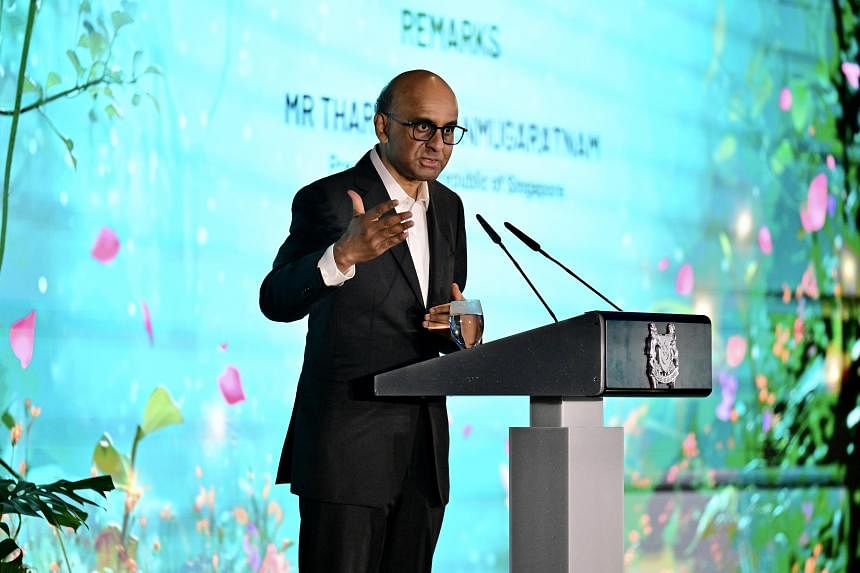SINGAPORE - Addressing the triple crises of climate change, water and biodiversity loss together will yield much greater economic opportunities and benefits to society than dealing with each separately, Singapore President Tharman Shanmugaratnam said on April 15 in a call to action for financiers.
That is because climate change, the growing crisis over water shortages and pollution, and damage to ecosystems are all interlinked.
“The sum of benefits that we get from addressing climate change, water and biodiversity together is much larger than the individual benefits we get from addressing one or the other. That’s what it boils down to,” he said in a speech on the sidelines of the Ecosperity Week 2024 conference being held at the Sands Expo and Convention Centre.
He also noted that there is a great opportunity to remodel economies and to forge closer partnerships between the public and private sectors and philanthropies, with the latter playing a critical role in providing early-stage risk capital to drive innovation and accelerate change.
President Tharman pointed to the trillions of dollars needed for the global economy to reach net-zero emissions by 2050.
“Those trillions of dollars are not a cost. They are an investment for growth, jobs and an inclusive future. The world has not seen for a very long time the opportunity to boost growth and jobs and to spur the development path for more than half of humanity.”
For example, the International Monetary Fund has said 1 per cent of global gross domestic product in additional spending on public investment can create more than seven million jobs worldwide through its direct employment effects alone. The global capital market is valued at about US$250 trillion (S$340 trillion), meaning there is sufficient money to accelerate the green transition.
“We are well past the thinking that acting to mitigate and adapt to climate change is a cost you pay today to avoid some painful cost in the future. Acting on mitigation and adaptation to climate change is a massive opportunity for benefits today, not just avoiding a cost in the future,” he said.
The benefits include economic growth, including creating jobs in new green industries such as renewable energy, benefits in terms of more efficient and less polluting agriculture, improved crop yields and better incomes for farmers, plus cleaner air and fewer illnesses from air pollution.
For the finance sector, a new era of public-private partnerships involving governments, philanthropies and private capital are key to the global green transformation, he said.
“You have co-investment and you have all three parties taking risks, and expecting rewards together. It’s a huge opportunity to remodel what we think of as a market economy.”
But critically, President Tharman said, there needs to be a shift in thinking towards tackling the climate, water and biodiversity crises together because they are so interlinked.
For instance, about two billion people do not have access to clean water. And agriculture is also a major consumer of water and a major driver of deforestation. This damages water catchments and also changes local weather, leading to hotter and drier conditions and less rainfall, creating a vicious circle.
Solving the water crisis not only improves human health and access to water, but it also tackles the biodiversity crisis by halting the removal of forests and other key ecosystems, which in turn is good for reducing the threat from climate change because forests suck up large amounts of planet-warming carbon dioxide from the atmosphere.
“And you also improve soil health and the ability to store carbon. Solving for water helps biodiversity and carbon and global warming,” he said.
Neither pessimism nor over-optimism will solve the environmental challenges humanity faces.
“We have to avoid complacent optimism, as well as catastrophic thinking, both of which breed inaction. We have to be unsettled enough to want to engage with some boldness and some urgency in purposeful action,” he added.


